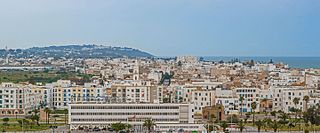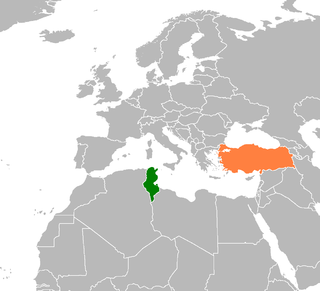Related Research Articles

Tunisia, officially the Republic of Tunisia, is the northernmost country in Africa. It is a part of the Maghreb region of North Africa, and is bordered by Algeria to the west and southwest, Libya to the southeast, and the Mediterranean Sea to the north and east; covering 163,610 km2 (63,170 sq mi), with a population of 11 million. It contains the eastern end of the Atlas Mountains and the northern reaches of the Sahara desert, with much of its remaining territory arable land. Its 1,300 km (810 mi) of coastline include the African conjunction of the western and eastern parts of the Mediterranean Basin. Tunisia is home to Africa's northernmost point, Cape Angela; and its capital and largest city is Tunis, located on its northeastern coast, which lends the country its name.

The Tunisia national football team represents Tunisia in men's international football since their maiden match in 1957. It is governed by the Tunisian Football Federation, founded in 1957 after the Tunisian independence in 1956. Tunisia are colloquially known as The Eagles of Carthage. The team's colours are red and white, and the Bald eagle its symbol. There have been periods of regular Tunisian representation at the highest international level: from 1962 to 1978, from 1994 to 2008 and again from 2014 onwards. Most of Tunisia's home matches are played at the Stade Hammadi Agrebi in Radès since 2001. The team represents both FIFA and the Confederation of African Football (CAF).

Popular Unity Movement, is a socialist political party in Tunisia.

Tunisian Arabic, or simply Tunisian, is a set of dialects of Maghrebi Arabic spoken in Tunisia. It is known among its over 11 million speakers as: تونسي, romanized: Tounsi[ˈtuːnsi](listen), "Tunisian" or Derja "everyday language" to distinguish it from Modern Standard Arabic, the official language of Tunisia. Tunisian Arabic is mostly similar to eastern Algerian Arabic and western Libyan Arabic.

La Goulette, in Arabic Halq al-Wadi, is a municipality and the port of Tunis, Tunisia.
The Kore University of Enna, in Italian Università Kore di Enna, is a university founded in 2004 in Enna, the capital city of the Province of Enna, in the center of Sicily and has been visited by two Italian Presidents. The university has very modern facilities; it also has a strong relationships with governments and universities of the Mediterranean Sea countries and with some of European and U.S. areas.

The Tunisia national rugby union team is a third tier rugby union nation. They first started competing in 1979 and they competed in the African qualification for the 2007 Rugby World Cup.

Ben Arous is a city in north-eastern Tunisia, part the agglomeration of Tunis, also called "Grand Tunis". It is located south of Tunis city center and is the capital of the Ben Arous Governorate.

Tunisian Victory is a 1944 Anglo-American propaganda film about the victories in the North Africa Campaign.
The Tunisia Davis Cup team represents Tunisia in Davis Cup tennis competition and are governed by the Fédération Tunisienne de Tennis.
The Second Tunisia Plan was an economic development plan implemented by the government of President Habib Bourguiba from 1965 to 1968.

The Tunisian passport is issued to citizens of Tunisia for international travel.

Tunisian–Turkish relations are foreign relations between Tunisia and Turkey. Tunisia has an embassy in Ankara and a consulate-general in Istanbul. Turkey has an embassy in Tunis. The diplomatic relations between Turkey and Tunisia were established in 1956 just after Tunisia gained its independence. Both countries are full members of the Union for the Mediterranean. The countries have had strong ethnic and cultural ties since the Ottoman colonization of Tunisia starting in the early 16th century. Due to several centuries of at least nominal Ottoman control of Tunisia, as much as 25% of Tunisians are at least partially of creole Turkish descent. Both countries signed The Treaty of Friendship and Cooperation on 15 September 2011. Turkey helped Tunisia after the Jasmine Revolution with financial and technical aid. Tunisia and Turkey have good economic ties. Many Tunisian merchants buy clothing (mostly) and other goods from Turkey. Also, Turkey is a very popular tourist destination for Tunisians. Citizens of both countries can travel visa-free between each other. Turkey and Tunisia are allies under the Major non-NATO ally agreement.

Korbous is a town and commune in the Nabeul Governorate, Tunisia. As of 2004 it had a population of 3,551.

Sakiet Ezzit is a town and commune in the Sfax Governorate, Tunisia. Attached administratively to the governorate of Sfax, it is the center of a delegation counting 72 481 inhabitants in 2006 and is a municipality with 44,886 inhabitants in 2004.2 The city itself has a population of 12 613 inhabitants. As of 2004 it had a population of 44,886.

Boukha is a distilled beverage produced from figs. It originated in the Tunisian Jewish community, where most of it is still produced.

The Tunisian National Guard is the national gendarmerie force of the Republic of Tunisia and separated from the Tunisian Armed Forces.

France–Tunisia relations refers to current and historical relationship between France and Tunisia. France conquered Tunisia in 1881 and established the French protectorate of Tunisia, which lasted until Tunisia's independence in 1956. In 1957, France cut off financial aid totaling $33.5 million to Tunisia because of its support for neighboring Algeria's independence movements. At the time, Tunisian President Habib Bourguiba noted "France and Tunisia will never again be exclusive partners". From 1987 until the 2011 Tunisian Revolution, France refused to criticize Tunisian President and ally Zine El Abidine Ben Ali, despite the deaths of numerous non-violent protesters. Ben Ali eventually resigned.

Ellyes Joris Skhiri is a French-born Tunisian professional footballer who plays as a midfielder for Bundesliga club 1. FC Köln and the Tunisia national team.

On 26 June 2015, a mass shooting occurred at the tourist resort at Port El Kantaoui, about 10 kilometres north of the city of Sousse, Tunisia. Thirty-eight people, 30 of whom were British, were killed when a gunman, Seifeddine Rezgui, attacked a hotel. It was the deadliest non-state attack in the history of modern Tunisia, with more fatalities than the 22 killed in the Bardo National Museum attack three months before. The attack received widespread condemnation around the world. The Tunisian government later "acknowledged fault" for slow police response to the attack.
References
- ↑ Jamal, Vali (1991). Tunisia: Rural Labour and Structural Transformation. p. 2.